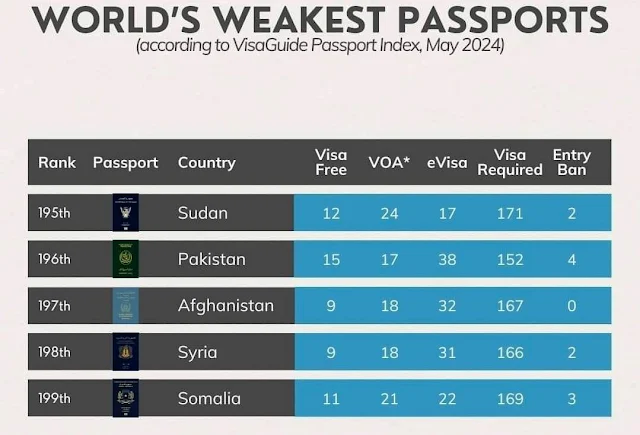 |
| World Weakest Passport |
Introduction:
In today's interconnected world, passports serve as the ultimate symbol of global mobility and access. They are not merely pieces of identification but gateways to opportunity, adventure, and cross-cultural exchange. However, not all passports are created equal. While some grant their holders effortless entry into numerous countries, others significantly restrict travel freedom. This essay delves into the concept of passport power, explores the factors contributing to the weakness of certain passports, and reflects on the broader implications of such disparities.Understanding Passport Power:
Passport power refers to the level of visa-free access a passport provides to its holders. The Henley Passport Index and the Passport Index are among the notable rankings that measure passport strength based on the number of destinations its holders can visit without requiring a visa or with visa-on-arrival privileges. At the top of these rankings are passports from affluent and politically stable countries like Japan, Singapore, and Germany, offering their citizens unparalleled freedom to explore the world.Factors Contributing to Weak Passports:
The weakness of a passport can be attributed to a myriad of factors, including diplomatic relations, security concerns, economic stability, and geopolitical dynamics. Countries facing ongoing conflicts, political instability, or strained international relations often find their passports at the bottom of global rankings. For instance, nations like Afghanistan, Iraq, Syria, and Somalia consistently rank among the weakest passports due to security concerns and limited diplomatic ties.Impact on Citizens:
The ramifications of holding a weak passport extend far beyond inconveniences at border crossings. Citizens of countries with weak passports face significant barriers when it comes to international travel, education, employment opportunities, and even family visits. They often encounter stringent visa requirements, lengthy application processes, and high fees, which can deter them from exploring the world or pursuing opportunities abroad. Consequently, their mobility is severely restricted, limiting their ability to engage in global discourse and benefit from cross-cultural experiences.Broader Implications:
The existence of weak passports underscores the inherent inequalities in our globalized world. It highlights the privilege enjoyed by citizens of affluent and politically stable nations, who can traverse borders with relative ease, while others face insurmountable barriers. Such disparities perpetuate a system where mobility is disproportionately distributed based on nationality, reinforcing existing power imbalances and socioeconomic inequalities. Moreover, they raise questions about the notion of global citizenship and the responsibilities of more privileged nations in promoting equitable access to mobility and opportunity.Conclusion:
In conclusion, the concept of passport power offers valuable insights into the dynamics of global mobility and access. The existence of weak passports serves as a stark reminder of the uneven distribution of privilege and opportunity in our world. Addressing these disparities requires not only addressing the underlying factors contributing to passport weakness but also fostering a more inclusive and equitable approach to global citizenship. Only by acknowledging and confronting these challenges can we work towards a world where all individuals enjoy the freedom to explore, learn, and connect across borders, regardless of the passport they hold.Pakistan's Passport Ranking:
Pakistani passport typically ranks low in global passport rankings, indicating limited visa-free access for its holders. The exact ranking may vary depending on the methodology and updates in diplomatic relations and visa policies between countries. However, Pakistan's passport usually falls within the bottom quarter of global rankings, alongside other countries facing similar geopolitical challenges.
Factors contributing to the lower ranking of the Pakistani passport include security concerns, political instability, and strained diplomatic relations with certain countries. These issues often result in stringent visa requirements and limited visa-free access to many destinations, impacting the mobility and travel opportunities for Pakistani citizens.
It's important to note that rankings can fluctuate over time due to changes in diplomatic relations, visa policies, and global events. Therefore, individuals seeking the most up-to-date information on the ranking of the Pakistani passport should refer to recent editions of passport indices such as the Henley Passport Index or the Passport Index. These indices provide comprehensive insights into the strength of passports worldwide based on visa-free access and visa-on-arrival agreements.




